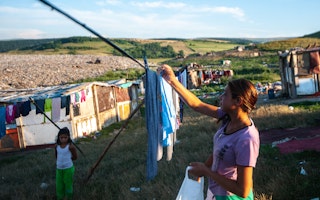In Romania, Romani women are the ones most likely to suffer from inequalities inside the home, as well as inadequate health care, poor quality of education, and lack of job opportunities. Broadening the Agenda: The Status of Romani Women in Romania, a report prepared for the Open Society Roma Participation Program, provides a realistic portrayal of the challenges that Romani women in Romania face through first-hand accounts and solid data compiled by Romani women themselves.
The following are a few of the report's results:
- More than 63 percent of Romani women declared that women have fewer rights than men in Romani communities.
- Almost a quarter of the women had no formal education. Among Romani men, only 15 percent had no education. Meanwhile, less than 4 percent of the women in Romania's general population had no formal education.
- A majority of the women said that employers discriminate against Roma on ethnic grounds. More than 21 percent of respondents thought that workplace discrimination was based on gender.
- Thirty-nine percent of the women had not earned any income in the last year. Of those who were employed, 54 percent worked informally in jobs that provided no benefits or work agreements.
Combining fresh survey data and the voices of Romani women reflecting on their status, Broadening the Agenda is intended to provoke debate among stakeholders, and promote effective policies that erase gender disparities and combat discrimination, poverty, and social exclusion.
Read more
Roma Rights
A New Roma-led Vision of Power

The new, independent, Roma Foundation for Europe is backed by a €100 million pledge that builds on Open Society’s over 30 years of support for Roma causes.
Roma Rights
Q&A: A Step Toward Justice for Roma Women

In November, the Slovak Republic formally apologized to Roma women for a program of forced sterilizations that stretched out for decades. How a Slovak human rights group helped hold the government accountable.
The Time Is Now
Where Roma Rights and Environmental Justice Meet

Leaders in the EU are confronted with a dual obligation—to restore healthy environments for Roma, and to do so with the full participation of Roma communities themselves.
